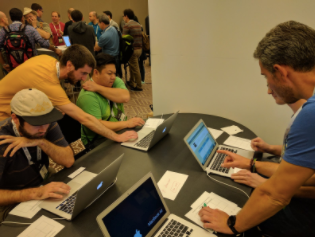We’re headed to Vancouver this week, with about 25 Googlers who are incredibly excited to attend
Node.js Interactive. With a mix of folks working on Cloud, Chrome, and V8, we’re going to be giving demos and answering questions at the Google booth.
A few of us are also going to be giving talks. Here’s a list of the talks Googlers will be giving at the conference, ranging from serverless Slack bots to JavaScript performance tuning.
Wednesday, October 4th
Keynote: Franzi Hinkelmann9:40am - 10:00am, West Ballroom AFranzi Hinkelmann, Software Engineer @ Google
Franzi is located in Munich, Germany where she works at Google on Chrome V8. Franzi, like James and Anna, is a member of the Node.js Core Technical Committee. She speaks across the globe on the topic of JavaScript virtual machines. She has a PhD in mathematics, but left academia to follow her true passion: writing code.
Franzi will discuss her perspective on Chrome V8 in Node.js, and what the Chrome V8 team is doing to continue to support Node.js. Want to know what the future of browser development looks like? This is a must-attend keynote.
Functionality Abuse: The Forgotten Class of Attacks12:20pm - 12:50pm, West Ballroom ANwokedi Idika, Software Engineer @ Google
If you were given a magic wand that would remove all implementation flaws from your web application, would it be free of security problems? If it took you more five seconds to say “No!” (or if, worse, you said “Yes!”), then you’re the target audience for this talk. If you’re in the target audience, don’t fret, much of the security community is there with you. After this talk, attendees will understand why the answer to the aforementioned question is an emphatic “No!” and they will learn an approach to decrease their chance of failing to consider an important vector of attack for their current and future web applications.
High Performance JS in V85:20pm - 5:50pm, West Ballroom APeter Marshall, Software Engineer @ Google
This year, V8 launched Ignition and Turbofan, the new compiler pipeline that handles all JavaScript code generation. Previously, achieving high performance in Node.js meant catering to the oddities of our now-deprecated Crankshaft compiler. This talk covers our new code generation architecture - what makes it special, a bit about how it works, and how to write high performance code for the new V8 pipeline.
Thursday, October 5th
New DevTools Features for JavaScript11:40am - 12:10pm, West Meeting Room 122Yang Guo, Software Engineer @ Google
Ever since v8-inspector was moved to V8's repository, we have been working on a number of new features for DevTools, usable for both Chrome and Node.js. The talk will demonstrate code coverage, type profiling, and give a deep dive into how evaluating a code snippet in DevTools console works in V8.
Understanding and Debugging Memory Leaks in Your Node.js Applications12:20pm - 12:50pm, West Meeting Room 122Ali Sheikh, Software Engineer @ Google
Memory leaks are hard. This talk with introduce developers to what memory leaks are, how they can exist in a garbage collected language, the available tooling that can help them understand and isolate memory leaks in their code. Specifically it will talk about heap snapshots, the new sampling heap profiler in V8, and other various other tools available in the ecosystem.
Workshop: Serverless Bots with Node.js2:20pm - 4:10pm, West Meeting Room 117Bret McGowen, Developer Advocate @ Google
Amir Shevat, DevRel @ Slack
This talk will show you how to build both voice and chat bots using serverless technologies. Amir Shevat, Head of Developer Relations at Slack, has overseen 17K+ bots deployed on the platform. He will present a maturing model, as best practices, for enterprise bots covering all sorts of use cases ranging for devops, HR, and marketing. Alan Ho from Google Cloud will then show you how to use various serverless technologies to build these bots. He’ll give you a demo of Slack and Google Assistant bots incorporating Google’s latest serverless technology including Edge (API Management), CloudFunctions (Serverless Compute), Cloud Datastore, and API.ai.
Modules Modules Modules3:00pm - 3:30pm, West Meeting Room 120Myles Borins, Developer Advocate @ Google
ES Modules and Common JS go together like old bay seasoning and vanilla ice cream. This talk will dig into the inconsistencies of the two patterns, and how the Node.js project is dealing with reconciling the problem. The talk will look at the history of modules in the JavaScript ecosystem and the subtle difference between them. It will also skim over how ECMA-262 is standardized by the TC39, and how ES Modules were developed.
Keynote: The case for Node.js4:50pm - 5:05pm, West Ballroom AJustin Beckwith, Product Manager @ Google
Node.js has had a transformational effect on the way we build software. However, convincing your organization to take a bet on Node.js can be difficult. My personal journey with Node.js has included convincing a few teams to take a bet on this technology, and this community. Let’s take a look at the case for Node.js we made at Google, and how you can make the case to bring it to your organization.
We can’t wait to see everyone and have some great conversations. Feel free to reach out to us on Twitter
@googlecloud, or
request an invite to the Google Cloud Slack community and join the
#nodejs channel.
By Justin Beckwith, Languages and Runtimes Team









